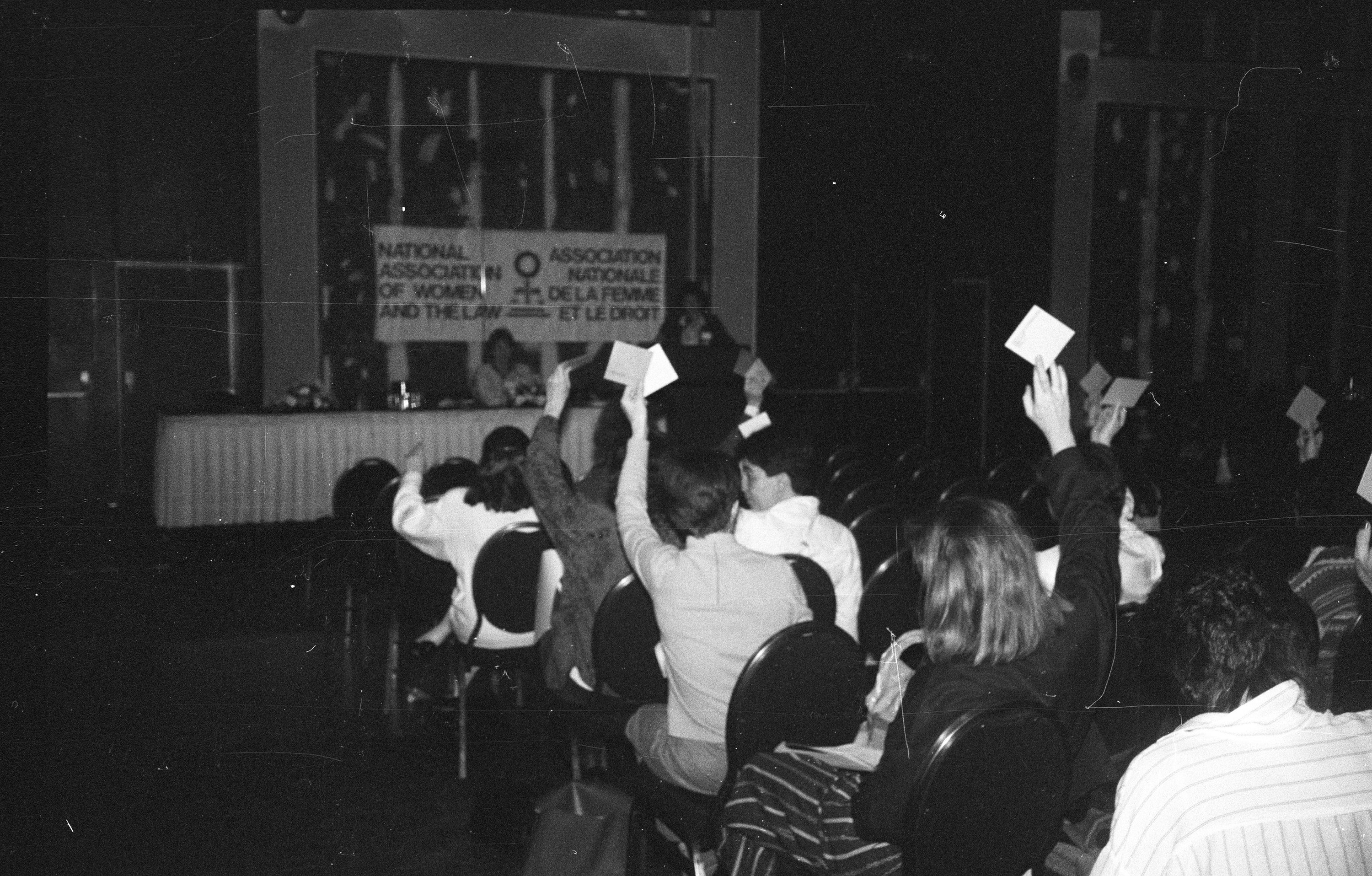NAWL Brief on Bill C-5—An Act to Amend the Judges Act and the Criminal Code


Organizational Endorsements
- Accessibility for All
- Action Ontarienne contre la violence faite aux femmes
- Amnesty International Canada
- AMS Sexual Assault Support Centre
- Avalon Sexual Assault Centre
- Barbra Schlifer Commemorative Clinic
- BC Society of Transition Houses
- Campaign 2000
- Canadian Centre for Gender and Sexual Diversity
- Canadian Council of Muslim Women
- Canadian Research Institute for the Advancement of Women
- Canadian Women's Foundation
- Colchester Sexual Assault Centre
- DisAbled Women's Network Canada
- Egale Canada Human Rights Trust
- Ending Violence Association of Canada
- Feminist Alliance for International Action
- International Women's Rights Project
- Les Femmes Michif Otipemisiwak — Women of the Métis Nation
- Luke's Place Support and Resource Centre for Women and Children
- Metropolitan Action Committee Violence Against Women and Children
- National Congress of Black Women Foundation
- Native Women's Association of Canada
- Ontario Association of Interval and Transition Houses
- PEI Family Violence Prevention Services Inc
- PEI Rape and Sexual Assault Centre
- Regroupement des maisons pour femmes victimes de violence conjugale
- Rise Women's Legal Centre
- Sexual Violence New Brunswick
- South Asian Legal Clinic of Ontario
- WAVAW Rape Crisis Centre
- West Coast LEAF
- Women's Centre for Social Justice, o/a WomenattheCentrE
- Women's Legal and Education Action Fund
- Women's Shelters Canada
- YWCA Canada
Introduction
Comments and Context for NAWL’s Recommendations
NAWL congratulates the Government for its commitment to judicial continuing education aimed at increasing women’s confidence in the criminal justice system. Bill C-5 is a legislative re-introduction, with important amendments, of Bill C-337, the Judicial Accountability through Sexual Assault Law Training Act introduced in Parliament in February 2017. Bill C-337 was a political response to a profound lack of public confidence in the way the criminal justice system dealt with allegations of sexual assault.2See Rosemary Cairns-Way and Donna Martinson, “Judging Sexual Assault: The Shifting Landscape of Judicial Education in Canada” (2019) 97:2 Canadian Bar Review, available on-line at https://cbr.cba.org/index.php/cbr/issue/view/571.
NAWL knows that women’s mistrust of the criminal justice system is not a new phenomenon. In 1993, the Honourable Bertha Wilson, in her capacity as Chair of the Canadian Bar Association Task Force on Gender Equality, recommended mandatory “sensitivity” training on gender and racial bias for all judges. One year later, the Canadian Judicial Council (CJC) approved a resolution supporting the development of “comprehensive, credible and in-depth education programs on social context issues including gender and race.” Special project funding from the Department of Justice assisted with the implementation of the resolution, allowing for the appointment of full-time legal and pedagogic experts, and enabling consultation with public stakeholders. The current approach to judicial education in Canada is a direct result of that initial resolution, and the arms-length funding support it received. That larger context must inform the study of Bill C-5 if it is to begin to achieve the important objectives set out in the preamble.
The amendments are consistent with judicial independence, properly understood. This legislation is far from an attempt to wrest judicial oversight of professional development from the judiciary. Rather, it is a specific and carefully tailored response to the significant and ongoing failure of the criminal justice system to respond adequately to sexual violence. This failure denies women equal access to justice and to the protection of law. Precise drafting and unambiguous objectives, read in the context of a detailed preamble that identifies the rights, specifically women’s equality rights at issue, will ensure that judicial independence is not threatened.
The previous government tabled a budget in 2017 which allocated 2.7 million dollars over five years (and .5 million per year thereafter) for the CJC to support programming on judicial education, ethics and conduct.3Budget 2017, Building a Strong Middle Class, online: The specific allocation to the judiciary is set out in Part 5, 189 of the PDF version. NAWL urges the committee to recommend the provision of additional arms-length funding linked to this legislation, similar to the funding provided by the Department of Justice for the Social Context Education Project described above. Volunteer judges, even with the support of national organizations such as the NJI and the CJC, will be unable to engage in the kind of careful, thoroughgoing curriculum development this programming requires without support. In addition, the essential and significant consultative obligations contained in the legislation require adequate time and resources to ensure their success, and, in particular to take account of women’s diversity and the impact that diversity has on the experience of sexual assault and of the system’s response to it. Done properly, these consultations will increase the likelihood that judicial education will enhance women’s equality, increase women’s trust in the administration of justice, and reduce the intersecting discriminatory burdens borne by women who choose to report a sexual assault.
Provincial courts hear the vast majority of sexual assaults. The federal government has no jurisdiction to mandate training for provincially appointed judges. The provision of arms-length funding enabling the production of a comprehensive, in-depth and credible curriculum on sexual assault will have an indirect impact on the continuing education available to provincially appointed judges. It will create a judicial education resource available to any court, or group of courts, in Canada. This may encourage the delivery of all-court conferences in particular provinces, something which occurred during the implementation of the Social Context Education Project, and which broke down existing silos between courts dealing with the same issues.
Overview of the Legislation
In this brief NAWL will address three key components of the amendments to the Judges Act proposed in Bill C-5. For ease of reference, the relevant current sections of the Judges Act are set out below, with the proposed amendments included in bold.
3 No person is eligible to be appointed a judge of a superior court in any province unless, in addition to any other requirements prescribed by law, that person …
(b) undertakes to participate in continuing education on matters related to sexual assault law and social context, including by attending seminars established under paragraph 60(2)(b).
60 (1) The objects of the Council are to promote efficiency and uniformity, and to improve the quality of judicial service, in superior courts.
Powers of the Council
(2) In furtherance of its objects, the Council may …
(b) establish seminars for the continuing education of judges, including seminars on matters related to sexual assault law and social context; …
Seminars related to sexual assault law
(3) The Council shall ensure that seminars on matters related to sexual assault law established under paragraph (2)(b)
(a) are developed after consultation with persons, groups or organizations the Council considers appropriate, such as sexual assault survivors and groups and organizations that support them; and
(b) include instruction in evidentiary prohibitions, principles of consent and the conduct of sexual assault proceedings, as well as education regarding myths and stereotypes associated with sexual assault complainants.
Essentially, these amendments do three things:
- They add an eligibility criterion. Applicants for judicial appointment to the superior courts must now undertake to participate in certain continuing education programs as a condition of appointment.
- They specify the topics and some of the content of the education programs for judicial applicants and for the Canadian Judicial Council (CJC).
- They require the CJC to ensure that “appropriate” stakeholders are consulted during the development of the education.
Analysis and Recommendations
Summary
Thank you
This Brief on Bill C-5 was prepared by Professor Rosemary Cairns Way for the National Association of Women and the Law, with inputs provided by NAWL staff, Suki Beavers and Rachel Kohut.
NAWL gratefully acknowledges the many contributions and support that informed the development of this brief, including those made by the following organizations: Deepa Mattoo (Barbra Schlifer Commemorative Clinic), Anuradha Dugal (Canadian Women’s Foundation), Karine-Myrgianie Jean-Francois (DisAbled Women’s Network of Canada), Tamsin Fitzgerald (Les Femmes Michif Otipemisiwak/Women of the Métis Nation), Pamela Cross (Luke’s Place Support and Resource Centre for Women and Children), Lolly Bennett (National Congress of Black Women Foundation), Marlene Ham (Ontario Association of Interval and Transition Houses), Mathilde Trou (Regroupement des maisons pour femmes victimes de violence conjugale), Kim Hawkins (Rise Women’s Legal Centre), Silmy Abdullah and Shalini Konanur (South Asian Legal Clinic of Ontario), Raji Manjat (West Coast LEAF) and Anjum Sultana (YWCA Canada).


